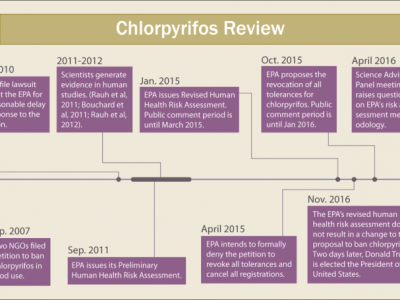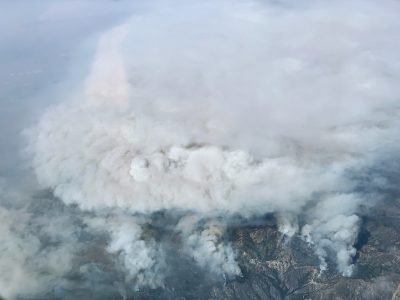The Ninth Circuit Makes EPA an Offer It Can’t Refuse
Regulate chlorpyrifos or else!
Chlorpyrifos is one of the most widely used pesticides in America, although it has been banned in the EU. Last week, the Ninth Circuit took the extraordinary step of ordering EPA pointblank to ban or reduce traces of chlorpyrifos in food. A dissenter accused the majority of misreading the statute in question and abusing its discretion by limiting EPA's options so drastically and giving it only sixty days to act. Warning: The majority and dissenting opinions cover 116 p...
CONTINUE READINGTime to End FERC’s Misguided Effort to Fix Wholesale Power Prices
A FERC ruling tilts the playing field against renewable energy. It should be repealed.
In 2018, the Federal Energy Regulatory Commission (FERC) decided that state clean energy policies were distorting energy markets operated by PJM, the country’s largest grid region. That, at least, was the view of the Commissioners who were appointed by Republican presidents. PJM, which runs the electricity grid more or less from Chicago to Maryland, has now decided that FERC’s idea is unworkable. It’s planning to ask FERC to change its rule before the rule does r...
CONTINUE READINGBiden and the Environment: The First 100 Days
Biden has set up a lot of future actions. But he's already got some notches on his belt.
Tomorrow marks Biden’s first 100 days in office. He’s appointed a great climate team and is negotiating an infrastructure bill that focuses on climate change. With luck, those actions will produce major environmental gains down the road. There are also some solid gains in the form of actions that have already come to fruition. Here's where things stand. Executive orders. Trump seemed to delight in issuing anti-environmental executive orders. All of those are gone ...
CONTINUE READINGBiden Administration Sets Stage for Action on Vehicle Greenhouse Gas Pollution
Complementary actions by NHTSA and EPA clear the way for EPA to restore California’s waiver for tailpipe GHG emissions and its EV mandate
In two complementary actions in the last week, the Biden administration has set the stage for more stringent regulation of greenhouse gas (GHG) emissions from passenger vehicles—one of the country’s single largest sources of pollution that causes climate change. Today, the Environmental Protection Agency published a notice that it would reconsider the Trump administration’s withdrawal of California’s waiver to set tailpipe greenhouse gas emissions standard...
CONTINUE READINGFive Myths About Climate Policy
Debate about climate policy is often distorted by misconceptions.
In this post, I want to talk about some of the ideas that make it hard to have sensible discussions about climate policy. I don’t mean outright climate denial. Instead, I’m talking about less blatant misconceptions that keep many people from thinking seriously about cutting carbon emissions. Myth #1. EPA climate rules are a regulatory power grab. The main agency regulating greenhouse gases is EPA. Because the first regulations were issued under Obama, it’...
CONTINUE READINGAmerican Soil
Soil is an important carbon sink. It's literally going down the drain, eroding away.
Today is Earth Day. Let's talk about something earthy: the dirt under our feet. When I was a kid growing up in central Illinois, the topsoil was black and went down about a foot. When I was a little older and tried gardening, I was amazed at the fertility of the soil. When I’ve gone back there more recently, however, I’ve been startled by the thin, gray look of the soil on the farms. I wondered if it had eroded away, blown off the fields by the spring winds ...
CONTINUE READINGOffering “Carrots” to Protect the Amazon
Brazil asks for a billion dollars to slow deforestation. Would this be cooperation or extortion?
In March, US President Joe Biden invited the leaders of 40 countries to a virtual climate change summit, which takes place today and tomorrow. During the lead-up to this, many countries announced commitments of varying specificity and firmness to reduce greenhouse gas emissions. (I hope to write soon on the European Union.) Brazil's position is remarkable but has maintained a fairly low profile in the news media. Brazil's greenhouse gas emissions fro...
CONTINUE READINGCommon Ground on Climate: Understanding the US-China Joint Statement
After months of growing geopolitical tensions, the US and China have finally found something to agree on: the need to confront the climate crisis. In fact, two days of meetings last week in Shanghai between US Special Presidential Envoy for Climate John Kerry and his counterpart, Special Climate Envoy Xie Zhenhua have culminated in the release of a joint statement. This breakthrough comes just days before top officials from around the world convene virtually for the Bide...
CONTINUE READINGStraws in the Wind
Businesses have intensified public support for climate action. That could presage a major shift in climate politics.
In the past few weeks, there’s been a notable growth of business support for climate action. A letter from the CEOs of 300 hundred major companies called for a 50% cut from 2005 carbon emissions by 2030. The companies ranged from the utilities to tobacco to investment management. Google, McDonalds, Walmart, and Philip Morris were among the signatories. The reasons the companies gave for this target were many: Catalyzing a zero-emissions future, Spurring a r...
CONTINUE READINGGuest Contributors Leeza Arbatman, Michael Cohen, and Shawna Strecker: New California Bills Provide Pathway for Local Wildfire Risk Reduction in Southern California
SB 85 and SB 63 create opportunities for wildfire prevention strategies proposed by UCLA California Environmental Legislation and Policy Clinic
We are students in UCLA Law’s California Environmental Legislation and Policy Clinic, a course in which students work with legislative staff in the California State Legislature to advance environmental policy goals. In Fall 2020, working with staff for State Senator Henry Stern, we developed recommendations for local government efforts to manage wildfire risk. Now, new legislation could help make proposals like ours a reality: This week, SB 85, allocating $73 mi...
CONTINUE READING












